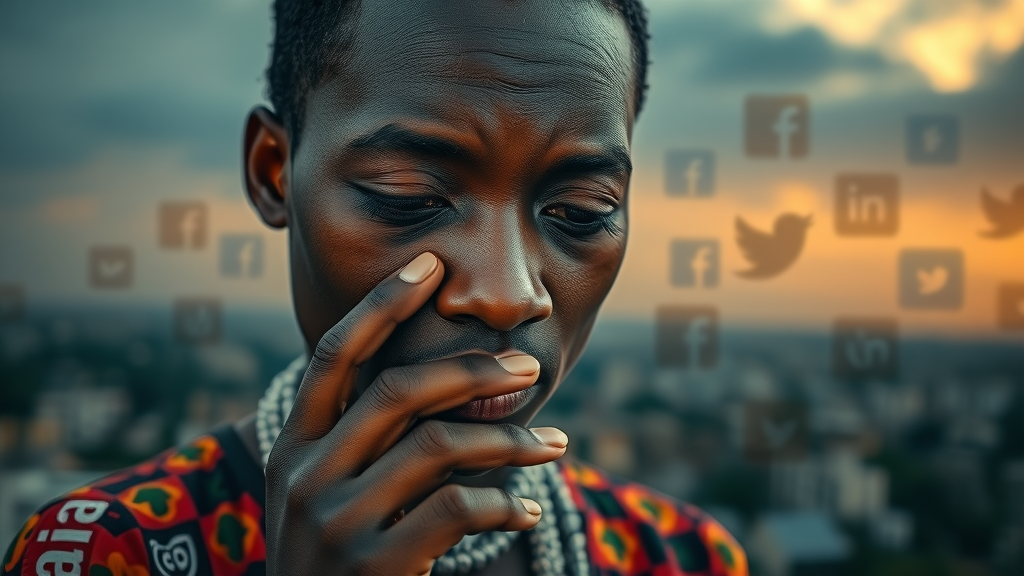Did you know that social media algorithms can erase years of painstaking brand equity overnight? For media entrepreneurs across Africa, this alarming reality exposes a fragile dependence that undermines long-term growth and sovereignty. In this article, we delve deep into media empire strategy Africa , uncovering the risk of digital sharecropping and the urgent imperative of digital sovereignty. Discover how African media leaders can transition from vulnerable reliance on global platforms to owning and controlling their digital destinies.
Startling Realities of Social Media Dependence in African Media Empires
Social media algorithms can erase years of brand equity overnight , wiping out audience reach and visibility in a blink.
Most African leaders unknowingly become digital sharecroppers, working hard but owning none of their digital real estate.
Systemic biases in global platforms hinder African media growth by limiting exposure and skewing content promotion.

The modern African media entrepreneur faces unique challenges imposed by third-party social platforms. These algorithms change unpredictably, often deprioritizing African voices and content without warning. Many media empires have risen over years only to have their visibility vanish overnight due to platform policy shifts or opaque algorithmic changes. This startling dependence not only jeopardizes brand relevance but also risks severe business disruption, echoing what Digital Momentum Agency Team calls a "digital sharecropper's dilemma."
Understanding the Digital Sharecropper's Dilemma in Media Empire Strategy Africa
"When you build your entire brand on Instagram, LinkedIn, or TikTok, you're essentially a sharecropper on someone else's land. You're working incredibly hard to build an audience, but you own nothing." — Senior Strategist, Africa Chronicle
The Risks of Relying on Third-Party Platforms
Loss of control over audience reach due to algorithm changes: Sudden shifts can marginalize content with little recourse.
Vulnerability to platform shutdowns or policy shifts: Business continuity is threatened if the platform alters terms or ceases operation.
Inability to monetize or leverage owned data fully: User data remains inaccessible for strategic audience engagement.

This digital sharecropping traps many African leaders in an unsustainable cycle. Despite investing effort and resources, their brands depend utterly on platforms that may not prioritize African content, often shaped by systemic biases and global economic interests. As the Senior Strategist from The Africa Chronicle explains, this situation is not just risky — it’s a fundamental threat to sustainable media empire strategy in Africa.
The Imperative of Digital Sovereignty in African Media Empire Strategy
"Digital Sovereignty means strategic ownership of your digital real estate—your website, your email list, your content distribution channels. It's about building an owned media platform that becomes your digital fortress." — Senior Strategist, Africa Chronicle
Key Pillars of Digital Sovereignty
Owning and controlling your website: Your primary digital asset ensuring full control over content and user experience.
Building and maintaining an email list: Direct communication with your audience without intermediaries.
Creating and distributing original content independently: Establishing authentic voice and dependable reach.

Embracing digital sovereignty empowers African media entrepreneurs to reclaim authority over their audiences and narratives. Instead of relying on unpredictable algorithms, owners create resilient platforms that withstand external shocks. This approach aligns with a decolonial blueprint for African media independence by safeguarding cultural influence and economic potential.
Print Media and Its Role in Modern African Media Empires

Integrating Traditional Print Media with Digital Sovereignty
Leveraging print media for credibility and reach: Print remains a trusted format bridging urban and rural audiences.
Using print to complement owned digital channels: Print and digital create a synergistic content ecosystem.
Bridging generational and technological divides: Print engages older or offline populations vital to broad media reach.
Despite the digital revolution, print media continues to serve as a critical asset in African media empires, especially when integrated with digital sovereignty strategies. It offers authentic credibility, helping media businesses access audiences across diverse demographics. Modern media leaders recognize that safeguarding reach involves harmonizing print’s tangible presence with innovative digital platforms, creating a truly resilient media powerhouse.
African Media: Challenges and Opportunities in the Digital Age

Systemic Biases and Algorithmic Barriers
Global algorithms often disadvantage African content: Less visibility and reach compared to western-centric narratives.
Limited representation in mainstream digital narratives: African stories are marginalized or stereotyped online.
Necessity for localized content strategies: Tailoring content to specific audiences to circumvent biases.

The digital landscape presents a double-edged sword for African media players. They face systemic barriers embedded in algorithmic design and global content preferences. However, this challenge creates an opportunity to innovate localized strategies and build proprietary platforms that prioritize African voices, ensuring fairer representation and broader influence.
Modern Media Trends Shaping Media Empire Strategy Africa
From Social Media to Owned Media Platforms
Shift towards content ownership and direct audience relationships: Moving beyond ephemeral social posts to lasting connections.
Importance of email marketing and website engagement: Direct channels to foster loyalty and immediate feedback.
Emergence of decentralized content distribution: Using diverse platforms to reduce dependence on any single entity.

The evolution from social media dependence to owned media platforms marks a pivotal shift in African media empire strategies. Leaders are now prioritizing building durable relationships via owned websites and email lists, which provide clarity, control, and monetization opportunities. Decentralized models also guard against volatile platform policies, strengthening sustainability.
The MVR Mandate: Minimum Viable Relationship for Sustainable Media Empires
"The MVR Mandate means owning the three pillars: your website, your email list, and your content creation process. This is the foundation for a resilient media empire." — Senior Strategist, Africa Chronicle
Implementing the MVR Mandate in African Media Strategies
Developing a robust, user-friendly website: Your digital headquarters designed for engagement and growth.
Growing and nurturing an email subscriber base: Creating a loyal community reachable anytime without platform interference.
Consistently producing high-quality, original content: Ensuring relevance and authority to maintain audience interest.

The MVR Mandate encapsulates a pragmatic framework for African media entrepreneurs to establish independence and resilience. By focusing on owned digital assets and authentic audience relationships, it builds defenses against unpredictable external platform disruptions, fostering sustainable growth and influence.
Common Mistakes African Media Entrepreneurs Make
Overreliance on social media platforms: Betting the business on rented digital land leads to vulnerability.
Neglecting owned digital assets: Ignoring websites and email lists reduces control and growth potential.
Ignoring audience data and direct communication channels: Missing insights that foster engagement and loyalty.

Many African media creators fall into pitfalls that jeopardize their long-term viability. The allure of instant social media fame blinds them to the necessity of cultivating owned channels and data-informed strategies. As a result, valuable audience connections and revenue opportunities slip away, underscoring a critical learning curve in media empire strategy Africa.
Actionable Tips for Building a Resilient Media Empire Strategy Africa
Invest in a professional website with SEO optimization: Maximize discoverability and user experience.
Start and maintain an active email marketing campaign: Build and nurture a direct, engaged audience.
Create diverse content formats to engage different audiences: Videos, articles, podcasts - diversify engagement.
Regularly analyze audience data to refine strategies: Continuously improve based on insights and feedback.
Executing these tips strengthens media entrepreneurs’ foundation, enabling them to steer clear of pitfalls and harness opportunities for growth. Transitioning from social media reliance to digital sovereignty involves building robust, owned platforms and prioritizing meaningful audience relationships.
Comparison Table: Control and Risk Across Platforms in Media Empire Strategy Africa
Platform |
Control Level |
Risk |
Recommendation |
|---|---|---|---|
Low |
Algorithm changes, account suspension |
Use as a funnel to owned media |
|
Website |
High |
Technical maintenance required |
Primary digital asset |
Email List |
High |
Spam filters, list decay |
Direct audience communication |
People Also Ask
What is digital sovereignty and why is it important for African media? Digital sovereignty refers to owning and controlling your digital platforms and content, crucial for African media to avoid dependence on external algorithms and biases.
How can African leaders build their own media empires? By prioritizing owned assets like websites, email lists, and original content to create sustainable audience relationships.
What are the risks of relying solely on social media platforms? Loss of control over reach, vulnerability to sudden policy changes, and inability to monetize or access audience data fully.
How does the MVR Mandate support media independence? It mandates ownership of key digital assets, fostering resilience and direct audience engagement.
Key Takeaways on Media Empire Strategy Africa
Digital sovereignty is essential for sustainable African media empires to avoid being vulnerable to global platform shifts.
Owning your website, email list, and content is critical to maintain control and cultivate loyal audiences.
Social media platforms should be used as tools, not foundations to funnel traffic rather than anchor business.
The MVR Mandate provides a strategic framework for minimum viable relationships that safeguard against external disruptions.

Conclusion: Embracing Digital Sovereignty to Secure Africa’s Media Future
"The time for Digital Sovereignty is now. African media leaders must build on owned digital assets to protect their brands and narratives." — Senior Strategist, Africa Chronicle
In a rapidly evolving media landscape, African entrepreneurs face a crucial crossroads. Falling prey to social media dependence puts their brands at constant risk. By embracing the principles of digital sovereignty and adopting the MVR Mandate , media empires in Africa can reclaim control, build lasting influence, and create resilient platforms that advance the continent’s stories and economic power sustainably.
Ready to Build Your Digital Fortress?
Explore strategic insights for African founders at The Founders Africa
Visit east.africafrontlinemedia.com for expert guidance and resources
In the rapidly evolving African media landscape, several organizations exemplify the shift from social media dependence to digital sovereignty. For instance, MTN Group, Africa’s largest mobile operator, has partnered with UK-based Synamedia to develop a new streaming platform tailored for mobile and fiber subscribers across the continent. This initiative aims to transform video consumption in Africa by offering high-quality, accessible, and regionally curated content strategies that reflect local languages, cultures, and viewing preferences. ( reuters.com )
Similarly, Pulse Africa has expanded its digital-first publishing model across multiple African countries, including Nigeria, Ghana, Kenya, Senegal, Côte d’Ivoire, and Uganda. By unifying all its media assets under the Pulse brand, the company has built a resilient media empire that prioritizes owned digital platforms over reliance on third-party social media channels. ( en.wikipedia.org )
These examples underscore the importance of digital sovereignty in building resilient media empires in Africa. By owning and controlling their digital platforms, African media leaders can mitigate the risks associated with social media dependence and ensure sustainable growth and influence.
 Add Row
Add Row  Add
Add 




Write A Comment